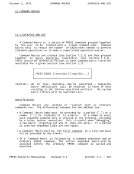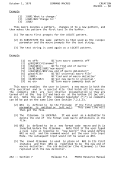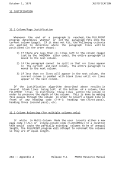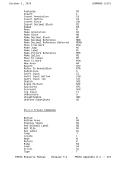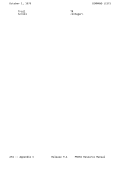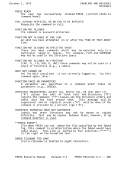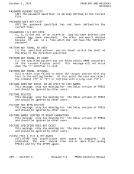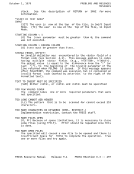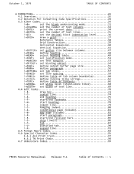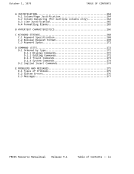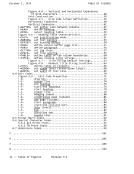October 1, 1979 FORMATTING FORMAT MACROS
4.5 FORMAT MACRO CODES ______________________
Format Macros are user defined codes which are abbreviations
for arbitrary combinations of text and/or format codes. A macro
definition must be of the form:
!.<macroname>=<anystring>.
<macroname>...the name of the format macro. This will be
replaced during FULLPRINT with <anystring>.
<anystring>...the string (often containing format codes) for
which <macroname> is an abbreviation. It
replaces <macroname> during FULLPRINT.
NOTES _____
• Unless the macro definition is SCROLLED over during the FRESS
session, any occurrence of the macro code will not be defined.
Online this will cause the "UNDEFINED MACRO" message to be
typed. If FULLPRINT does not process the appropriate macro
definition, any undefined macro will be translated to the null
string and will be flagged on the far right with "****."
• Macros may be redefined at any time. Each definition is in
effect until another definition is encountered. The effect of
a macro can be eliminated by defining it to be the null string
as follows: "!.<macroname>=.".
• Macros may contain other macros. Simply imbed a macro code
within the macro definition, e.g., "!.mac2=<text>!.mac1..". If
a macro definition contains an undefined macro code, any
occurrence of the higher level macro will be flagged as
undefined.
• Macros have the same effect online as any format codes imbedded
in them. For example, the macro "!.in3=!-i3-.!", causes an
indentation of three spaces wherever the code "!.in3." appears
in the text.
character case is important • Unlike format codes, ___________________________ in identifying
macro names, "!.in3." is not equivalent to "!.IN3.". To avoid
confusion and to make text input easier, it is wise to use only
lower case characters when defining macro code names.
92 -- Section 4. Release 9.1 FRESS Resource Manual
4.5 FORMAT MACRO CODES ______________________
Format Macros are user defined codes which are abbreviations
for arbitrary combinations of text and/or format codes. A macro
definition must be of the form:
!.<macroname>=<anystring>.
<macroname>...the name of the format macro. This will be
replaced during FULLPRINT with <anystring>.
<anystring>...the string (often containing format codes) for
which <macroname> is an abbreviation. It
replaces <macroname> during FULLPRINT.
NOTES _____
• Unless the macro definition is SCROLLED over during the FRESS
session, any occurrence of the macro code will not be defined.
Online this will cause the "UNDEFINED MACRO" message to be
typed. If FULLPRINT does not process the appropriate macro
definition, any undefined macro will be translated to the null
string and will be flagged on the far right with "****."
• Macros may be redefined at any time. Each definition is in
effect until another definition is encountered. The effect of
a macro can be eliminated by defining it to be the null string
as follows: "!.<macroname>=.".
• Macros may contain other macros. Simply imbed a macro code
within the macro definition, e.g., "!.mac2=<text>!.mac1..". If
a macro definition contains an undefined macro code, any
occurrence of the higher level macro will be flagged as
undefined.
• Macros have the same effect online as any format codes imbedded
in them. For example, the macro "!.in3=!-i3-.!", causes an
indentation of three spaces wherever the code "!.in3." appears
in the text.
character case is important • Unlike format codes, ___________________________ in identifying
macro names, "!.in3." is not equivalent to "!.IN3.". To avoid
confusion and to make text input easier, it is wise to use only
lower case characters when defining macro code names.
92 -- Section 4. Release 9.1 FRESS Resource Manual



























































































































































































































































































